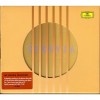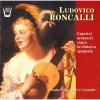Biography
Count Ludovico Roncalli, or simply Count Ludovico (fl. late 17th century), was an Italian nobleman who published a collection of suites for five-course baroque guitar, Capricci armonici sopra la chitarra spagnola ("Harmonic caprices for the Spanish guitar"), in 1692. Nothing is known about him except what can be gleaned from this publication (Strizich 2001). This was transcribed to modern notation and arranged for the six-string guitar by Oscar Chilesotti in 1881.[citation needed] The work, consisting of nine complete suites, each comprising several short movements, is a great favorite of guitar enthusiasts, and individual movements frequently appear in guitar method books. Frederick Noad, who compiled an anthology titled The Baroque Guitar, as well as other popular instruction books, did not rate the Chilesotti transcription highly, pointing to many omitted embellishments and octave errors relating to the fourth and fifth strings (Noad 1974,[page needed]). Another edition in modern notation was published by Bruno Henze, and released in 1955 by VEB Friedrich Hofmeister, Leipzig. Noad did not comment on whether this edition had corrected the deficiencies of the Chilesotti version.
The original is available in two facsimile editions, both published in 1979. A passacaglia from Roncalli's work was made famous in Ottorino Respighi's Ancient Airs and Dances.
Roncalli's Capricci armonici sopra la chitarra spagnola has been the exclusive subject of several recent recordings. One of the first was Sandro Volta's of suites I, II, IV, V, VII, and VIII on the Arion label in 1994 (ARN 68336). Jorge Oraisón recorded the entire cycle on 2 CDs for Vanguard Classics in 1996 (99151). Richard Savino recorded suites I, II, III, V, VII, and VIII for Dorian in 2008 (DSL-90604). Volta, Oraisón, and Savino used five-course guitars for their Roncalli recordings. 2004 saw the release of another recording devoted exclusively to Roncalli's work on the Italian label Tactus. It features Giacomo Parimbelli performing the complete suites except for V, VI, and IX, on a 19th-century instrument.








